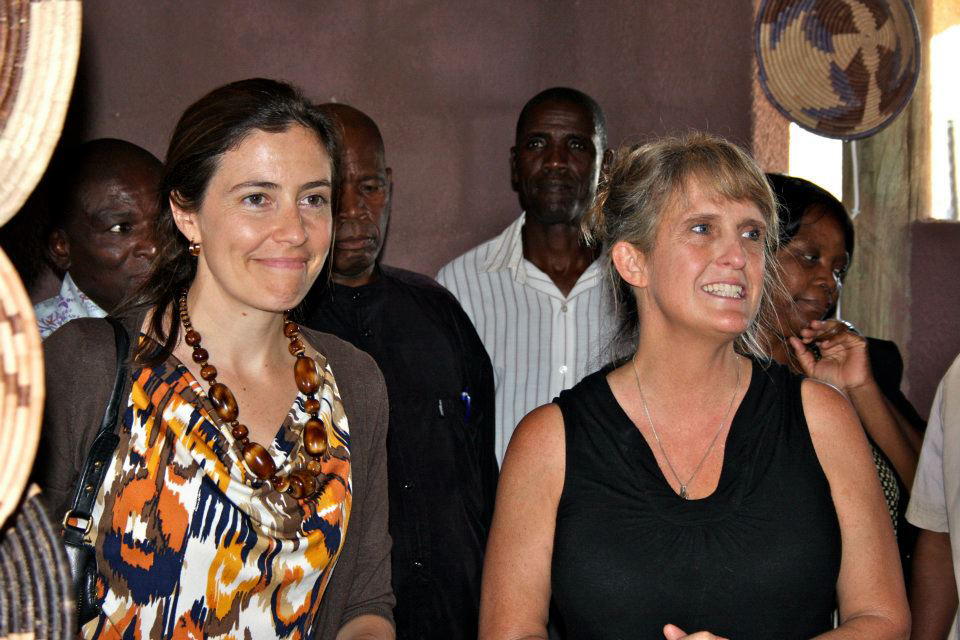Kathleen Alexander's work in Botswana attracts attention of U.S. ambassador

For tourists who go on safari to glimpse roaming elephants, lions, and hyenas, northern Botswana’s huge wildlife population is a good thing. For local communities, whose residents live in fear of animal attack and destruction of their livestock and food crops, coexisting with wildlife is a challenge. Kathleen Alexander, associate professor of wildlife in the College of Natural Resources and Environment, has spent more than 15 years researching human-wildlife conflict in Botswana and was instrumental in paving the way for a $2.6-million grant to help rural residents develop strategies to coexist with wild animals.
U.S. Ambassador to Botswana Michelle Gavin visited a tangible result of that grant — a craft center that will help unemployed rural women earn incomes to feed their families. Gavin was invited to the center’s opening in recognition of the cooperation between the Botswana government, Virginia Tech, and the Conservation of African Resources, Animals, Communities, and Land Use (CARACAL), a nonprofit organization that Alexander co-founded and of which she serves as president.
Alexander gave the ambassador an overview of her research and outreach program conducted in collaboration with CARACAL, which attempts to mitigate human-wildlife conflicts and makes women’s issues a priority. CARACAL is the local institution that provides facilitation of activities between the government and local communities under the various elements of the grant program.
Local chiefs and government officials also attended the grand opening event. Thirty women will soon market woven palm baskets and other crafts to tourists. As part of the program, these women will train other women in traditional craft skills.
More than one-third of northern Botswana’s population lives in poverty. With almost a fourth of the adult population suffering from HIV/AIDS, many women are caring for sick and orphaned family members. Run-ins with wildlife complicate agricultural endeavors. With the opening of the craft center, women are now able to develop and sell crafts directly to tourists in the Chobe River region of northern Botswana.
“With wildlife conflicts on the rise, we must find ways other than agriculture to help people escape from poverty,” Alexander said. “Local communities have had no place to sell to tourists. Now this center will allow local people to benefit directly from tourists coming to see their wildlife.”
The grant, funded by the Botswana government, as well the Global Environmental Facility through the World Bank, supports the Northern Botswana Human Wildlife Coexistence Project, which seeks to reduce the damage caused by wild animals, primarily elephants and predators. The project aims to strengthen the capacity of rural residents to develop proactive measures, such as deterring elephants with chili pepper plantings and bees. Another goal is to improve the skills and opportunities for local people to become more competitive in Botswana’s tourism industry, which relies on wildlife viewings.
“If communities do not value wildlife and see it as part of their livelihood — their future — Botswana’s vast wildlife assets will be eroded in favor of more lucrative land uses,” Alexander said. “We must engage communities in solutions if we are to secure a future for both people and wildlife.”
The project will focus on supporting the development of mitigation approaches to decrease human-elephant conflicts, a problem that plagues the people of northern Botswana. The region hosts the largest elephant population in Africa; elephants outnumber humans by almost three to one in Alexander’s study site of Chobe.
Alexander, who is an affiliated faculty member with the Fralin Life Science Institute, has spent most of the last 20 years in Botswana and still returns every summer with her research team to study the human-wildlife interface, emerging pathogens, and other topics. She applies a systems-biology approach to her research to holistically understand how humans, animals, and the environment interact. Alexander’s work in Botswana has included wildlife health and ecology, community-based natural resource management, and ecosystem management.
For more on Alexander’s research program in Botswana, visit her blog and the CARACAL Facebook page.
Related Links
- Kathleen Alexander finds brucellosis pathogen persists in Botswana buffalo, may pose a threat to humans
- Kathleen Alexander receives NSF grant to research human-animal linkage in water quality
- Virginia Tech professor discovers new tuberculosis pathogen
- Researcher explores role of human behavior in infectious disease emergence







.jpg.transform/m-medium/image.jpg)